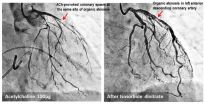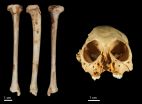Quit-smoking drug not linked to heart disease or depression
2015-09-07
(Press-News.org) A highly effective drug that helps smokers to quit does not increase their risk of heart attack and depression as was previously thought, research suggests.
Researchers who carried out the study say doctors can prescribe varenicline - also known as Champix™ or ChantixTM - more widely to help people stop smoking.
Varenicline is the most effective medication to help smokers quit but previous reports have suggested that users may be more likely to suffer a heart attack.
The drug has also been linked to depression, self-harm and suicide.
This latest research - which has for the first time simultaneously studied these potential side effects - supports recent studies that failed to find any evidence that varenicline has a negative effect on mental health. It also shows that taking the drug does not raise a person's risk of heart disease.
The team looked at anonymised health information from more than 150,000 smokers across England.
The patients had been prescribed either varenicline or another anti-smoking drug called bupropion to help them quit, or had used nicotine replacement therapy - such as patches, chewing gum or lozenges.
They were tracked for six months to assess any impact of the treatment on their health.
Researchers found that people taking either varenicline or buproprion were no more likely to suffer a heart attack than those using nicotine replacement therapy.
People were also not at higher risk of depression or self-harm, researchers say.
The study was led by researchers from the Universities of Edinburgh and Dusseldorf and is published in The Lancet Respiratory Medicine. Researchers at Maastricht University, University College London and Harvard Medical School also contributed to the study. Data were provided by QResearch.
Professor Daniel Kotz, from the Medical Faculty of the Heinrich-Heine-University Dusseldorf, said: "Smokers typically lose three months of life expectancy for every year of continued smoking. Our research supports the use of varenicline as an effective and safe tool to help people quit."
Professor Aziz Sheikh, Co-Director of the University of Edinburgh's Centre for Medical Informatics, said: "On the basis of our extensive analysis, we believe it is highly unlikely that varenicline has any significant adverse effects on cardiac or mental health. Regulators such as the United States Food and Drug Administration (FDA) should review its safety warning in relation to varenicline as this may be unnecessarily limiting access to this effective smoking cessation aid."
INFORMATION:
ELSE PRESS RELEASES FROM THIS DATE:
2015-09-06
Fewer patients are admitted at weekends, but are more likely to be sicker and have a higher risk of death from Friday through until Monday
Authors caution against using the data to estimate avoidable deaths, but call for more research into how services can be improved to reduce risk
Patients admitted to hospital at the weekend are more likely to be sicker and have a higher risk of death, compared with those admitted during the week, finds an analysis published in The BMJ this week.
The analysis was carried out as a collaboration between University Hospital Birmingham ...
2015-09-04
Action to prevent tooth decay in children, such as supervised tooth brushing and fluoride varnish schemes, are not just beneficial to children's oral health but could also result in cost savings to the NHS of hundreds of pounds per child, so says a leading dental health researcher.
Professor Elizabeth Kay, Foundation Dean of the Peninsula Dental School from Plymouth University Peninsula Schools of Medicine and Dentistry, has carried out the first economic evaluation of public health measures to reduce tooth decay in children at high risk, in association with the National ...
2015-09-04
An international team of scientists has developed what may be the first one-step process for making seamless carbon-based nanomaterials that possess superior thermal, electrical and mechanical properties in three dimensions.
The research holds potential for increased energy storage in high efficiency batteries and supercapacitors, increasing the efficiency of energy conversion in solar cells, for lightweight thermal coatings and more. The study is published today (Sept. 4) in the online journal Science Advances.
In early testing, a three-dimensional (3D) fiber-like ...
2015-09-04
Washington, DC - September 4, 2015 - Decontamination protocols eradicated both methicillin-resistant Staphylococcus aureus (MRSA) and antibiotic resistant, pathogenic intestinal bacteria, the Enterobacteriaceae, from a pig farm. The research appears online September 4th in ASM's journal Applied and Environmental Microbiology.
The study involved a farm on which both pathogens had been discovered through routine monitoring. The farmer had approached the investigators for help. The Enterobacteriaceae were expressing resistance genes called extended-spectrum β-lactamases ...
2015-09-04
WINSTON-SALEM, N.C. - Sept. 4, 2015 - A commonly prescribed antidepressant may alter brain structures in depressed and non-depressed individuals in very different ways, according to new research at Wake Forest Baptist Medical Center.
The study - conducted in nonhuman primates with brain structures and functions similar to those of humans - found that the antidepressant sertraline, a selective serotonin reuptake inhibitor (SSRI) marketed as Zoloft, significantly increased the volume of one brain region in depressed subjects but decreased the volume of two brain areas in ...
2015-09-04
Far above the wildfires raging in Washington's forests, a less noticeable consequence of this dry year is taking place in mountain ponds. The minimal snowpack and long summer drought that have left the Pacific Northwest lowlands parched also affect the region's amphibians due to loss of mountain pond habitat.
According to a new paper published Sept. 2 in the open-access journal PLOS ONE, this summer's severe conditions may be the new normal within just a few decades.
"This year is an analog for the 2070s in terms of the conditions of the ponds in response to climate," ...
2015-09-04
The misery of motion sickness could be ended within five to ten years thanks to a new treatment being developed by scientists.
The cause of motion sickness is still a mystery but a popular theory among scientists says it is to do with confusing messages received by our brains from both our ears and eyes, when we are moving.
It is a very common complaint and has the potential to affect all of us, meaning we get a bit queasy on boats or rollercoasters. However, around three in ten people experience hard-to-bear motion sickness symptoms, such as dizziness, severe nausea, ...
2015-09-04
This news release is available in Japanese.
Researchers at Kumamoto University in Japan have found that patients with coronary spasm have a higher risk of experiencing future heart attack particularly when a spasm occurs at the site of atherosclerotic coronary artery narrowing, i.e., coronary atherosclerotic stenosis.
Angina is caused by the narrowing of the blood vessels that carry blood to the heart, and vasospastic angina patients account for about 40% of all angina patients. The incidence and progression of the disease can be reduced through appropriate drug treatment ...
2015-09-04
ALLENDALE, Mich. -- An international team of scientists, including a Grand Valley State University professor and alumni, recently discovered a species of monkey fossil the team has dated to be more than one million years old.
The discovery was made after the team recovered a fossil tibia (shin bone) belonging to the species of extinct monkey Antillothrix bernensis from an underwater cave in Altagracia Province, Dominican Republic. The species was roughly the size of a small cat, dwelled in trees, and lived largely on a diet of fruits and leaves.
"We know that there ...
2015-09-04
As climate change accelerates ice melt in the Arctic, polar bears may find caribou and snow geese replacing seals as an important food source, shows a recent study published in the journal PLOS ONE. The research, by Linda Gormezano and Robert Rockwell at the American Museum of Natural History, is based on new computations incorporating caloric energy from terrestrial food sources and indicates that the bears' extended stays on land may not be as grim as previously suggested.
"Polar bears are opportunists and have been documented consuming various types and combinations ...
LAST 30 PRESS RELEASES:
[Press-News.org] Quit-smoking drug not linked to heart disease or depression




